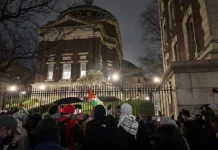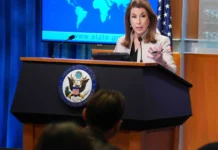For the last 40 years, many activists have worked hard to monitor press coverage of the Middle East and to call out anti-Israel bias masquerading as objective news. For many years, those who performed this task were routinely met with denials by journalists who sought to turn the tables on those criticizing their work. Many in the press responded by saying that those who discerned unfair, ignorant or blatantly false information in their articles or broadcast segments weren’t advocating for fairness. What they actually wanted, they responded, was coverage whose bias was for the Jewish state, rather than against it.
There was some truth in that. Most consumers of journalism, regardless of the topic, tend to prefer outlets that confirm their pre-existing biases and opinions as opposed to that which challenges them or at least makes them examine their assumptions.
The trouble wasn’t just that the press was faced with a tough task in telling stories about events in which many people have a vested interest. With respect to a great deal of the coverage of Israel, and especially about the conflict with the Palestinians, the problem was that the accounts were frequently based on a false narrative in which the Jews were oppressors of downtrodden Arabs. Instead of presenting their audiences with a coherent view of a complex century-long war against Zionism and an effort to destroy the one Jewish state on the planet, many in the press served up easy-to-understand stories about underdogs and bad guys.
In 2021, we’ve left that sort of pedestrian conversation about bad journalism behind us. The issue today is no longer the fact that many in the press often mangle work about subjects where they are essentially tourists pretending to be experts.
As last month’s act of front-page incitement against Israel on the part of The New York Times—in which it highlighted the pictures of children allegedly killed by Israel—amply illustrated, anti-Israel bias has come out of the closet. A new mindset has discarded the very idea of objectivity in favor of a belief that the duty of journalists is to advocate for a particular point of view.
Until the 21st century, and the rise of the Internet and social media, which have acted as a permission slip for many news reporters to become opinion writers on the side, that would have been considered heresy or abandonment of any notion of professional responsibility by the overwhelming majority of journalists, no matter their political point of view. But that trend was exacerbated in 2017 when, shocked by the election victory of former President Donald Trump, many in the mainstream press believed that they should have tilted their coverage of the 2016 campaign so as to somehow ensure his defeat. Over the course of the next four years, that was reflected by a shift in the way they covered the White House. Mainstream media outlets took on an openly partisan role that treated his presidency as illegitimate.
By the fall of 2020, as he headed to defeat beset by the impact of the coronavirus pandemic and the country’s fatigue with the Trump administration, that tilt even extended to refusing to cover stories that reflected poorly on his opponent, such as reporting on Hunter Biden’s alleged corrupt activities and falsely claimed they were the result of foreign disinformation.
Perhaps even more damaging was that virtually all of the liberal press labeled any questions about the origin of the pandemic that would have pointed the finger at the Chinese government as a conspiracy theory since that would have undermined the narrative that the impact of the public health catastrophe was solely Trump’s fault and focusing the national discussion solely on politicized critiques of his administration.
Six months after President Joe Biden’s inauguration, they’ve had to walk back that piece of journalism malpractice as it has become clear that suspicions about the culpability of the Wuhan Institute of Virology have a factual basis. Sadly, few if any of those who did their best to label the Wuhan lab theory as a right-wing lie have apologized for what they did or acknowledged their mistake and its possible impact on the election.
But rather than thinking seriously about this failure and what it means for the future of their profession, many in the media are undaunted. They considered Trump’s defeat a higher priority than journalistic ethics and have no qualms about cooking their coverage to hurt him.
What’s more, some in the press believe that what is needed is the extension of that same spirit of partisanship to the coverage of the Middle East.
That’s the conceit of an open letter published last week signed by more than 500 journalists in which they call for a change in the way that Israel is covered. As far as they are concerned, the problem with press accounts of the Middle East is that they aren’t biased enough. They believe all stories about Israelis and Palestinians should be told from the point of view of the latter.
With respect to the recent fighting in which Hamas and Palestinian Islamic Jihad terrorists in Gaza fired more than 4,000 rockets into Israel generating a counter-attack, they object to stories that tell the truth about what these groups were doing, as well as the consequences both for the Israelis who were attacked and the people in Gaza who were caught in the crossfire. In their view, anything other than stories about “asymmetrical” Israeli military advantages was wrong. In this version of reality, Palestinian terrorism is erased, and everything Israel does is called a “war crime.”
As far as the controversies in Jerusalem, such as the one in which Jewish property owners were suing to recover homes in which Palestinians were illegally squatting, which was the pretext for the latest onslaught against Israel, the signers of the letter demanded that this story be told solely as one in which colonial oppressors of an indigenous people were wrongly expropriated. The manifesto declared that all coverage should label Israel as an “apartheid state” persecuting people in the name of “ethnic supremacy.”
The double standards and the prejudice that this compendium of falsehoods puts forth aren’t just wrongheaded. In its focus on Israel, it bears the unmistakable sign of traditional anti-Semitic tropes, albeit couched in the language of critical race theory that the modern left has adopted as its catechism.
Were this letter merely the ravings of a few far left-wing ideologues, it could be ignored. Some of those who signed do fall into that category with many of them identifying as affiliated with radical outlets like The Nation, The Intercept or Al Jazeera, and the anti-Zionist and Marxist Jewish Currents or the openly anti-Semitic Mondoweiss. Others are people with jobs at publications considered merely liberal like HuffPost, the Texas Monthly or Buzzfeed.
But there were also many who signed that are working journalists at mainstream publications and broadcast outlets. Among those listed were employees of The Washington Post, The Chicago Tribune, The Los Angeles Times, The Boston Globe, The San Diego Union-Tribune, The New Yorker, New York magazine, Condé Nast, TIME, NPR, NBC and ABC.
Even more ominous was the fact that several dozen chose to sign anonymously while listing their publications including many from The New York Times, the Wall Street Journal, The Atlantic, NPR and other bastions of the press establishment. This shows that support for this noxious creed of demonizing the Jewish state has thoroughly infiltrated mainstream newsrooms to the point where it is no longer possible to single out or isolate those whose work is colored by anti-Israel and anti-Semitic bias.
The most important name on the letter was that of Nikole Hannah-Jones, author of the Times’ fallacious though Pulitzer-Prize winning “1619 Project,” which sought to rewrite American history so as to portray the United States as an irredeemably racist nation. Her name was listed without a mention of the Times, but unlike other employees of the paper, who may have justifiably feared that their editors would look askance at a call for more bias in the news, Hannah-Jones’ status as an icon of the Black Lives Matter movement renders her invulnerable to criticism from her employers.
Hannah-Jones’ place on the list is significant not just because she is the most famous of the signees. Rather, it is because she exemplifies the transition of the profession from one that seeks truth to one that believes its purpose is polemical advocacy for leftist ideologies. Critical race theory falsely labels all Jews and Israel as beneficiaries of “white privilege.” That allows those who think journalists must be soldiers for left-wing causes to believe it also mandates bias that pretends to answer to a higher truth about Israeli perfidy and Palestinian victimhood.
As we saw last summer when a woke mob in The New York Times newsroom demonstrated that it will determine what is or isn’t acceptable opinion at the paper, and was allowed to bully those who disagree, this letter is a sad indicator of the culture of 21st-century mainstream journalism. The Washington Post adopted the slogan “Democracy Dies in Darkness” to justify its crusade against Trump. But this letter could well be summed as proof that journalism is dying in broad daylight, and that it is being killed by journalists. This kind of treatment of Israel can be considered the canary in the coal mine that is telling us that any hope for saving the profession from ideological-based bias is already a lost cause.


























